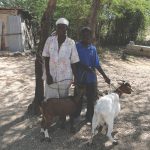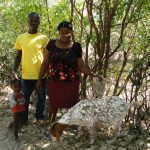Travel down a steep mountain path, rocky and dusty, to a community of thatch and rock homes in Marleguy and you meet Jean Baptiste. He is an elderly man – no one knows how old. He joined the La Gonâve Goat Project six years ago and after 3 days of training received a pregnant doe. He and his brother have worked hard to expand their herd of meaty goats, which they sell at market. His brother has been sick for a long time and requires regular medical care. Jean Baptiste says, “The goat is everything to me.”
 Another 10 minute walk, and you meet Yaya, a charming, outgoing grandmother of two. She was in the first goat training class in the fall of 2003. She is raising her grandsons; selling her goats is how she sends them to school and feeds her family. Her doe has 3 kids at a time: one she keeps for meat, one she sells at market and the other she will breed again. Follow a smaller path back into a thicket of shrubs and trees and you arrive at the home of Mr. and Mrs. Bazelais. He is a teacher, and helps his wife with the goats. They have 6 children and use the goats to feed their family. They also sell goats at market and use the proceeds to add PVC pipe as gutters on their home to catch rainwater and funnel it into a cistern of rocks.
Another 10 minute walk, and you meet Yaya, a charming, outgoing grandmother of two. She was in the first goat training class in the fall of 2003. She is raising her grandsons; selling her goats is how she sends them to school and feeds her family. Her doe has 3 kids at a time: one she keeps for meat, one she sells at market and the other she will breed again. Follow a smaller path back into a thicket of shrubs and trees and you arrive at the home of Mr. and Mrs. Bazelais. He is a teacher, and helps his wife with the goats. They have 6 children and use the goats to feed their family. They also sell goats at market and use the proceeds to add PVC pipe as gutters on their home to catch rainwater and funnel it into a cistern of rocks.
 In the past 9 years, 260 farmers just like Jean Baptiste and Yaya and Mr. and Mrs. Bazelais have received training in goat farming through the La Gonâve Goat Project. Here’s how the program works: Jean Thony meets with a community leader from a village to select two dozen “responsible” people who wish to become goat farmers. Then he must purchase local does and breeds them with the resident bucks. Once the does are pregnant, Jean Thony brings the selected farmers to the goat barn for 3 days of training on proper care of a goat. They learn about feeding, birthing, as well as how to check for illness or other problems. A farmer returns home with a pregnant doe. Jean Thony, the program coordinator, visits the farmers regularly, provides veterinary care and special goat feed, and also supervises the breeding and care of the bucks and does at the goat depot. This year, another 26 farmers are waiting to join the program; they will participate in 3 days of training, then receive a pregnant doe to start their own herd. Your contribution of $180 to the La Gonâve Goat Project gives a Haitian family the chance to become self-sufficient, to be well nourished, and to build a hopeful future.
In the past 9 years, 260 farmers just like Jean Baptiste and Yaya and Mr. and Mrs. Bazelais have received training in goat farming through the La Gonâve Goat Project. Here’s how the program works: Jean Thony meets with a community leader from a village to select two dozen “responsible” people who wish to become goat farmers. Then he must purchase local does and breeds them with the resident bucks. Once the does are pregnant, Jean Thony brings the selected farmers to the goat barn for 3 days of training on proper care of a goat. They learn about feeding, birthing, as well as how to check for illness or other problems. A farmer returns home with a pregnant doe. Jean Thony, the program coordinator, visits the farmers regularly, provides veterinary care and special goat feed, and also supervises the breeding and care of the bucks and does at the goat depot. This year, another 26 farmers are waiting to join the program; they will participate in 3 days of training, then receive a pregnant doe to start their own herd. Your contribution of $180 to the La Gonâve Goat Project gives a Haitian family the chance to become self-sufficient, to be well nourished, and to build a hopeful future.
